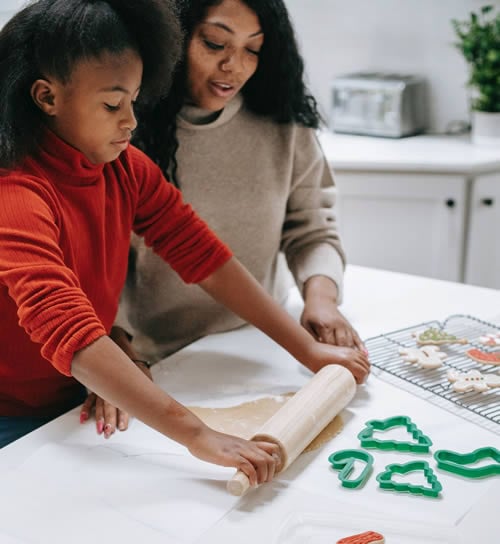In our series of tutor tips, we’re sharing everyday insights provided by highly talented Special Educational Needs (SEN) tutors, which include practical tips, plus a few words of inspiration – to help parents or carers of a child or young person with SEN. In this third post, Longina has provided some excellent tips for struggling parents and carers to help support children and improve the structure of the day.
You can book any of the highly experienced SEN tutors through our website. All have a wealth of knowledge and are dedicated to using their extensive experience and teaching skills to bring out the full potential of every child or young person. you can read more about each specialism in our dedicated pages about autism tuition and dyslexia tuition.
Dyscalculia is a condition that affects the ability to acquire arithmetical skills. Dyscalculic learners may have difficulty understanding simple number concepts, lack an intuitive grasp of numbers, and have problems learning number facts and procedures. Dyscalculia is understudied in comparison with dyslexia. However, it is estimated that dyscalculia is likely to occur in 3% – 6% of the population, and, unlike some other specific learning specialisms, is as likely to affect females as males.
Children and young adults with dyslexia and dyscalculia can still improve their maths skills – they might just need to take a different approach to build their understanding and confidence with numbers. They are likely to benefit from a structured learning approach that’s tailored to their needs, using real objects and plenty of discussions, rather than the standard method that’s traditionally offered in schools and other teaching environments.
Getting the right support at the right time can make an enormous difference to peoples’ lives and every student we help is considered as the unique individual he or she is.
Specialist SEN Tutor Longina’s Top Tips
 Tip 1: If you are struggling with teaching your child maths…
Tip 1: If you are struggling with teaching your child maths…
Get as much information as early as possible and immediately start making plans to help your child. Be positive, make maths fun and practice every day.
Tip 2: If you are struggling with teaching your child English…
The most important thing is your passion for the language; make sure your child can see this. Your child will need a lot of encouragement and praise. Be gentle and patient. Maybe your child needs more time to learn and absorb new information. Your child will learn to speak, read and write English in their own time.
Tip 3: If you are struggling helping your child to read…
Phonics is a highly effective way of teaching reading – and reading with understanding.
Tip 4: If you are struggling to get into a routine at home…
 Build a daily programme that functions best for your family. Choose times that are convenient for the whole family and be sure that everyone knows what and when something will happen. From the beginning, teach the ability to wait.
Build a daily programme that functions best for your family. Choose times that are convenient for the whole family and be sure that everyone knows what and when something will happen. From the beginning, teach the ability to wait.
Daily routine + structure + visual clues + daily rules = consistent routines = an easier life for your child.
Tip 5: If you are struggling to support your child with ADHD…
Manage your own stress and be realistic about what you can do. Look for help and ask for help and support. You are not on your own. Your family, friends, teachers, support groups and other professionals can help you too.
Structure and routines help manage stress and anxiety.
Tip 6: If you are struggling to support your child with autism…
First, you must find your child’s current interest. Next, you must find where your child likes to learn and when your child likes to learn. Remember to be patient and friendly, as well as firm. Your child needs somebody they trust.
Tip 7: If you are struggling to support your child with dyslexia…
You must find time to talk to your child. Your child is very smart and knows best what help is needed, so you need to ask: “Can I help you?” or “How can I help you?” Encourage your child to make decisions about how they learn best.
Tip 8: If you are struggling with your child’s focus and concentration…
Accept that your child can have a bad day but motivate and engage them as quickly as you can. Start by thinking about how you remember things. Use strategies that will involve taking a more active approach to learning.
Tip 9: If you are struggling with your child’s behaviour…
Observe your child carefully, look for body language. Is something too difficult, too boring or too easy? Your child may experience frustration and anger. Your child will need your help.
Engage with your child’s learning, listen, and respect their needs.
Tip 10: If you are struggling with your child’s sensory needs…
Remember that the more senses we use, the more likely it is that we will have a better memory and ability to remember. Involving your child in taking a more active approach to learning and revision could be a powerful strategy.
Tip 11: If you are struggling to remove your child from screens (laptops/iPads etc)…
 Children respond well to routines. Establish clear boundaries. Introduce a rule where there are no electronic devices after a certain time. Find something new where your child can become deeply engaged.
Children respond well to routines. Establish clear boundaries. Introduce a rule where there are no electronic devices after a certain time. Find something new where your child can become deeply engaged.
Tip 12: If you are struggling to develop your child’s communication and language…
Sing songs and rhymes, read stories, and ask your child to repeat words and phrases. Ask open questions. Play with your child using short instructions that your child can understand. Communicate verbally, but at the same time establish non-verbal ways of communicating with your child.
Tip 13: If you are struggling with your own mental health…
You are not on your own. Speak with your family member or a friend. Do not be afraid to contact your GP or a therapist. Concentrate on the present day.
Tip 14: If you are struggling with the idea transitioning back to school…
Your child’s happiness depends on yours. You can work with the school to make things better for you and your child. Organise meetings with your child’s teacher. Go to school and look around. Find out about the daily routine. Speak with your child.
Tip 15: If you are struggling to create rest and relaxation time for yourself…
Try to have enough quality time to rest and sleep. Take time to relax and practice mindfulness – for example doing breathing exercises for at least 3 minutes, twice a day.
Tip 16: If you are struggling to find the energy to support your child…
 Take some time out for both yourself and your child. Do something different for an hour and then revisit the task with a fresh mind. Spend as much as time on the task as you can both manage.
Take some time out for both yourself and your child. Do something different for an hour and then revisit the task with a fresh mind. Spend as much as time on the task as you can both manage.




